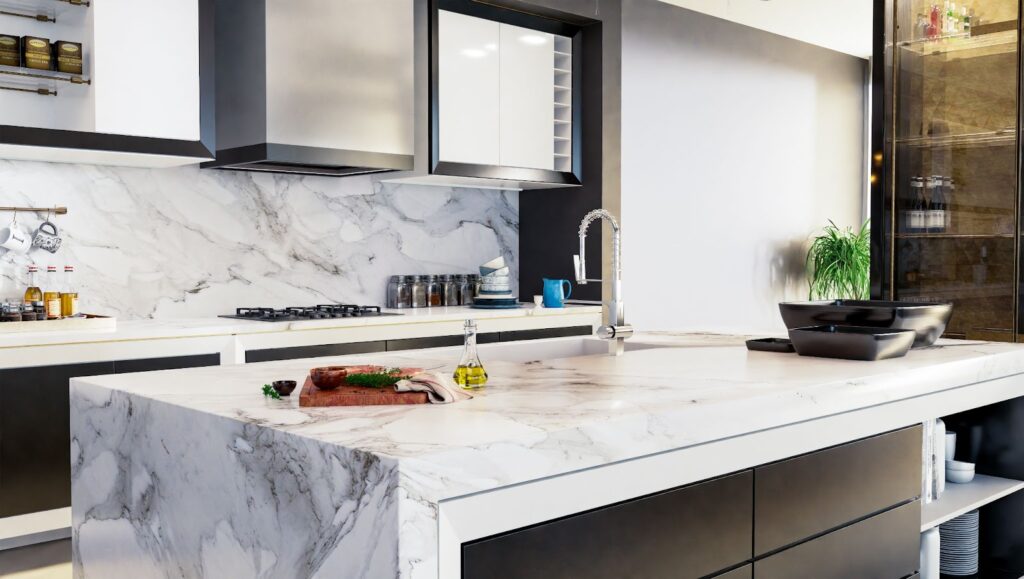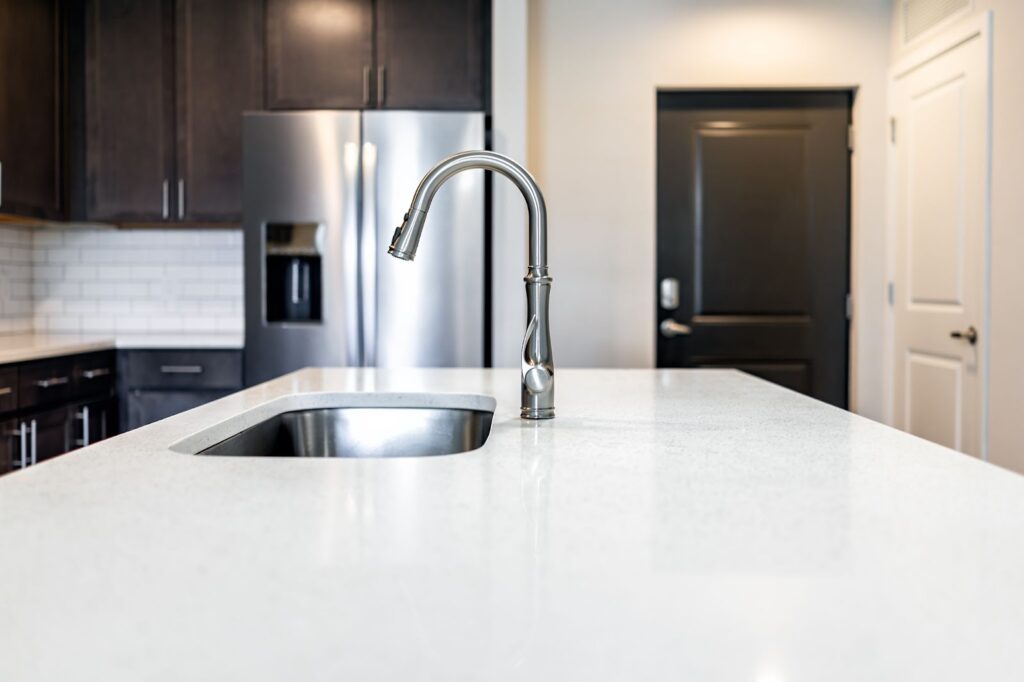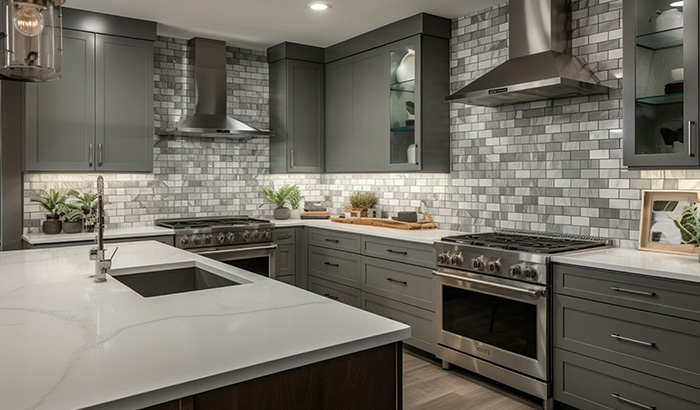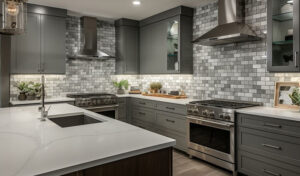In the ever-evolving world of kitchen design, quartz kitchen countertops have emerged as a beacon of durability, style, and ease. They marry the natural charm of stone with the resilience of modern engineering.
As this sought-after material takes center stage in homes around the globe, understanding how to clean quartz countertops becomes essential in preserving their beauty and functionality. This blog is designed to unravel the mysteries of quartz, from its composition and benefits to the nuances of its maintenance.
Whether you’re a long-time quartz enthusiast or considering this versatile material for your next renovation, this guide promises a deep dive into quartz kitchen countertops. It will ensure your investment continues to sparkle and shine for years.
Join us as we explore the allure of quartz, armed with the knowledge to keep it immaculate with simple yet effective cleaning tips.
What is quartz?
Quartz kitchen countertops are a marvel of modern engineering, blending natural beauty with industrial ingenuity. Unlike natural stone slabs, quartz countertops are crafted from a fusion of natural quartz crystals — among the hardest minerals on Earth — bonded with resins and pigments.
This manufacturing process not only imbues these surfaces with remarkable durability but also allows for a vast spectrum of colors and patterns, mimicking the look of natural stones like granite and marble or offering entirely unique aesthetics.
The result is a non-porous, hygienic surface that stands up to the rigors of daily kitchen use while providing a wealth of design possibilities, making quartz an increasingly popular choice for residential and commercial spaces seeking functionality and style.
Pros of quartz countertops
Durability
Durability is one of the major benefits of quartz kitchen countertops. Unlike natural stone countertops, such as granite or marble, quartz is a non-porous engineered material. This means it doesn’t absorb liquids, making it resistant to stains and spills.
Low maintenance requirements
Another advantage of quartz countertops is their low maintenance requirements. Unlike other types of countertops, such as wood or laminate, quartz does not require periodic sealing or polishing. Instead, easily clean it with mild soap and water, making it a perfect choice for busy households. Its non-porous surface also means that bacteria and germs have nowhere to hide, providing a safer environment for food preparation.
A variety of colors and patterns
Quartz kitchen countertops come in a wide variety of colors and patterns, allowing homeowners to choose the style that best suits their taste and complements their kitchen decor. Whether you prefer a classic white or a bold and vibrant color, you can customize quartz to match your desired look.
Additionally, the engineered nature of quartz allows for a consistent appearance throughout the entire slab, unlike natural stones that may have variations in color and pattern.
Sustainability
Quartz kitchen countertops also have several advantages in terms of sustainability. While natural stone countertops require mining, which might detrimentally impact the environment, quartz is an abundant material you can source sustainably.
Many quartz manufacturers use recycled materials to reduce waste and promote eco-friendly practices. This means that you’re able to enjoy the beauty of quartz countertops while minimizing your carbon footprint.

Cons of quartz countertops
When choosing the perfect countertop material for your kitchen, it’s essential to consider all the pros and cons. While quartz countertops have gained immense popularity in recent years, they have a few drawbacks.
Cost
Compared to other materials like laminate or tile, quartz countertops are on the more expensive side. If you have a large kitchen, this cost quickly adds up, making it less affordable for some homeowners.
Susceptible to heat
While quartz kitchen countertops are generally heat resistant, they are not entirely immune to heat damage. Placing hot pots or pans directly on the surface may cause it to crack or discolor. Always use trivets or hot pads when placing hot items on your quartz countertops to avoid this.
Additionally, sudden temperature changes, such as placing a freezing-cold object directly on a hot surface, also lead to cracks.
Limited color and pattern choices
Although quartz kitchen countertops offer a wide range of colors and patterns, they may not offer as much variety as natural stones like granite or marble. If you are looking for a specific pattern or unique veining, quartz might not be the best choice.
Vulnerability to chemicals
While quartz is generally considered resistant to stains, certain chemicals could damage the surface. Avoid harsh cleaners, especially those containing bleach or acidic ingredients, as they might lead to discoloration and permanent damage. Stick to gentle, non-abrasive cleaners specifically made for quartz kitchen countertops to maintain their pristine appearance.
Not ideal for outdoor use
Although quartz countertops are suitable for indoor use, they are not recommended for outdoor applications. Exposure to direct sunlight over extended periods causes fading or discoloration. Additionally, extreme temperatures and weather conditions, such as cracking or warping, lead to damage.
Not completely natural
While quartz kitchen countertops are made primarily of natural quartz stone, they also contain resins and pigments to bind the materials together. Some homeowners prefer fully natural materials like granite or marble, whereas quartz is considered semi-natural due to these additional components. If a fully natural countertop is essential for you, quartz may not meet your expectations.

Care tips for quartz countertops
Whether you already possess these beautiful surfaces in your home or are considering installing them, understanding how to care for them properly is essential to ensure their long-lasting beauty and functionality.
Quartz countertops are engineered stone surfaces that combine natural quartz crystals with resins and pigments. The result is a non-porous, stain-resistant, and highly durable surface that withstands the rigors of daily use. This engineered composition makes quartz an excellent choice for busy kitchens with unavoidable spills and messes.
Preventing stains
One of the most significant advantages of quartz countertops is their low maintenance requirements. Unlike natural stone surfaces that require regular sealing, quartz countertops are non-porous and do not require any sealing. This saves you time and effort and makes them more resistant to stains and bacterial growth.
However, it is essential to note that while quartz is highly stain-resistant, it is not entirely stain-proof. Therefore, immediately cleaning up spills, especially those involving acidic substances like lemon juice or vinegar, is crucial to prevent potential staining.
Regular cleaning
Regular cleaning is essential for caring for your quartz countertops. For day-to-day cleaning for how to clean quartz countertops, mild dish soap or a gentle surface cleaner is sufficient. Avoid harsh chemicals or abrasive cleaners that can dull the surface or cause damage.
Instead, opt for non-abrasive cleaning solutions or make a gentle, homemade cleaner using a mixture of water and white vinegar. Simply spray the solution onto the surface and wipe it clean with a soft cloth or sponge. Dry the countertops with a clean towel to prevent water spots or streaks from forming.
Preventing scratches
While quartz is a highly durable material, it is still susceptible to scratches. Cutting boards are recommended when chopping or slicing food to prevent scratches. Avoid using sharp knives directly on the surface, as this can leave permanent marks.
Similarly, using trivets or hot pads under hot pots and pans is essential to protect your quartz countertops from heat damage. Although they can withstand moderately high temperatures, prolonged exposure to extreme heat can cause thermal shock and lead to cracking or discoloration.
Avoid strong chemicals
Quartz countertops are known for their ability to resist common household chemicals. However, using strong chemicals, such as bleach or oven cleaners, on quartz surfaces should be avoided, as it can cause damage over time. If you accidentally spill any harsh chemicals, promptly rinse the area with water and clean it with a mild cleanser to prevent potential harm.
Resistance to bacteria and mold growth
Another significant advantage of quartz countertops is their resistance to bacteria and mold growth. Quartz’s non-porous nature inhibits the growth of harmful microorganisms, making it a hygienic choice.
However, to maintain this cleanliness, it is crucial to immediately wipe off any spills or messes and keep the countertops dry. If you’re curious about how to clean quartz countertops, rest assured it’s simple. Regularly disinfecting your countertops using a mixture of water and mild soap or an antibacterial cleaner will help ensure the surface remains clean and free from potential health hazards.
Intermountain Stone & Marble
Ready to elevate your space with the timeless elegance of quartz, marble, or granite countertops? Look no further than Intermountain Stone & Marble. Our exquisite collection, crafted from the finest materials, promises to bring your dream kitchen or bathroom to life.
Don’t compromise on quality or beauty — choose Intermountain Stone & Marble for countertops that blend durability with design, ensuring your home radiates sophistication for years to come.
Visit us today, and let our experts help you select the perfect centerpiece for your space. Your journey to a stunning home begins with Intermountain Stone & Marble.


